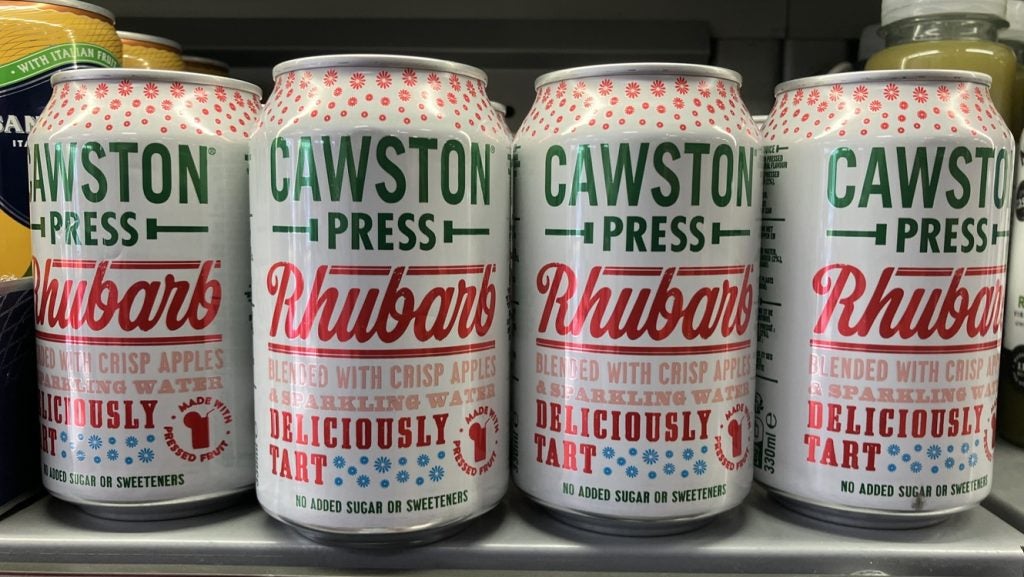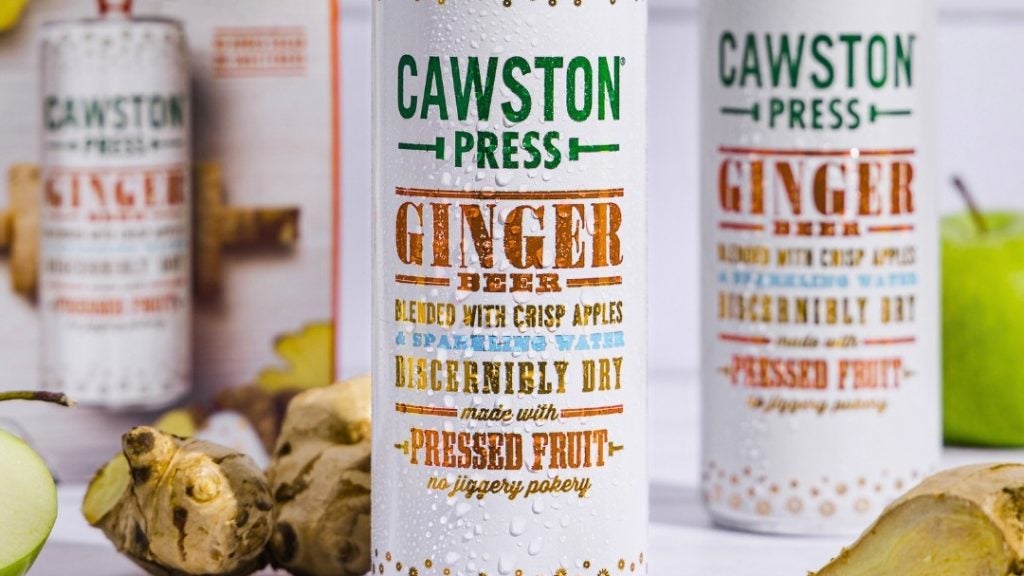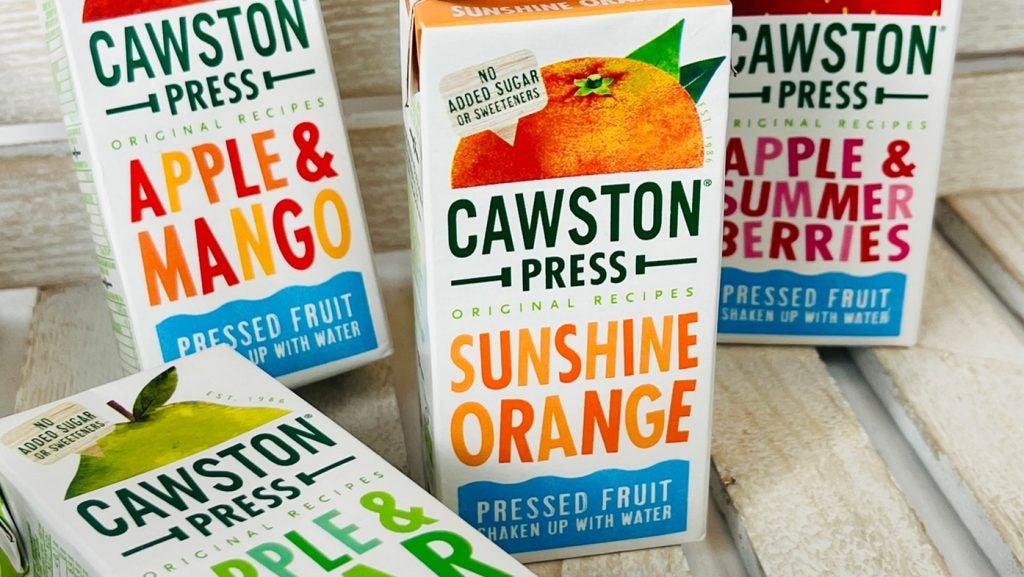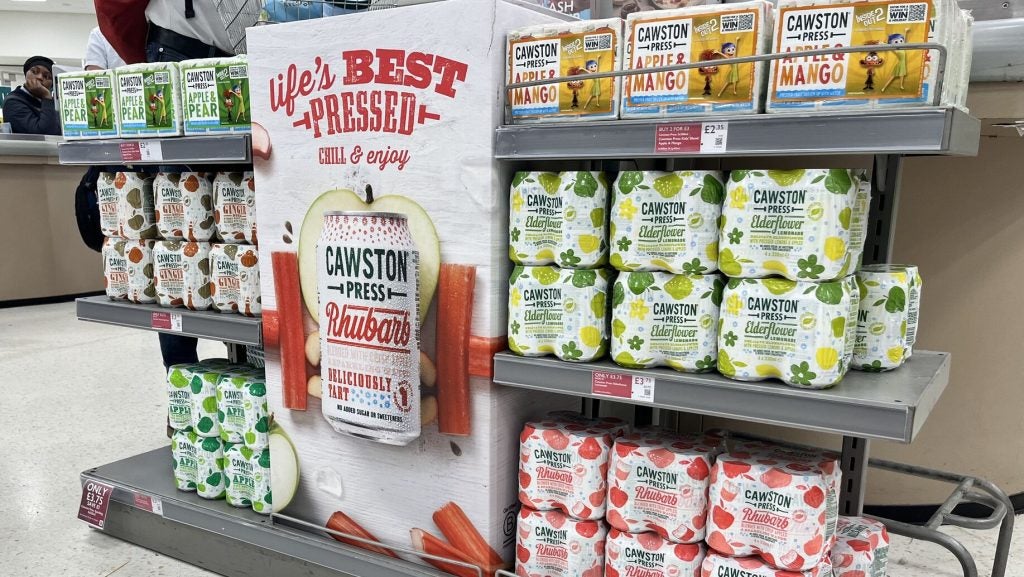With a range of pressed juices, carbonated soft drinks and kids’ cartons, UK business Cawston Press has shown itself able to grow in a fast-changing market while up against some powerful competitors.
MD Steve Kearns has just marked his tenth anniversary at the helm and, ahead of featuring at the Innovation in Non-Alcoholic Beverages conference in London later this month, he sat down with Just Drinks to discuss how Cawston Press has carved out a foothold in the market, where the company needs to improve and why he believes it can thrive in a sector offering consumers an ever-growing range of options.
Kristian Bayford (KB): How would you describe Cawston Press’ position in the UK soft drinks market? How do you try to stand out from the competition?
Steve Kearns (SK): We are a strong challenger brand that is based on great quality ingredients, no added sugar, no sweeteners, and no jiggery pokery, as we call it. We've got three different businesses under one roof: pressed juice, which is quite different and behaves quite differently to carbonated soft drinks; we’ve got fruit flavoured carbonates; and then a business that sits alongside brands like Fruit Shoot, Capri Sun and own label in kids’ juice box cartons. A quite different appeal and approaches to each of those different areas, which has a real benefit at times and has some challenges at other times.
I've been with CP now ten years. I came from a big business like Unilever where I was on the other side of the fence in one of those big, branded houses. I love being the little guy, up against the big brands and being the challenger has got something quite special about it. We don't have the budgets, we don't have the exposure, we don't have all the marketing collateral, etc. To win in those markets, when you don't have all of that, is so fulfilling.
KB: How would you describe Cawston Press’ performance over the last year and which areas of the business have seen the most growth?
SK: Across the board, we have a reasonably mixed business across grocery and the hospitality and out-of-home channels. It's split almost down the middle.
When I look at product performance, our sparkling range is the one that's been growing at the fastest rate, 20%-plus out-performance versus total market.
For juice, we're up, which is not the norm in that area. Juice is a market that's been relatively flat and we're at plus three versus the market performance.
Similarly, in our kids’ juice boxes, we're growing against the market performance as well. So, a blended performance across the board.
I'd say our sparkling drinks are the ones that have done more for us than other areas but, even within that, there's some nuances. Our beetroot and tomato juice in our pressed juice range are performing brilliantly and are real star performers.
KB: What are the main areas of growth you’re targeting?
SK: We're growing at 12% in value this year, so good growth. Every way you look, there's a big brand trying to squash you, or some new brands and other challenger brands in and around you.
For our core business, those areas that I just described would all be areas of focus [but] primarily our sparkling business. Sparkling cans is an area where there is interest as people are making well-informed choices, looking for different options, new flavours. They’re looking to add something new to their repertoire that's not just a Coke or a Diet Coke. That’s where we see the most growth.

10 September 2025. Credit: Just Drinks
KB: How do you plan to achieve that?
SK: We plan to double down on what's good about our brand and share it with more people. Our biggest opportunity is that there's still quite a lot of the market that have never tried the brand or our products. Our number one driver is awareness and therefore getting more people to buy into the brand.
We have around 50% prompted brand awareness. At the moment, that familiarity is still not quite there. I think the simplest way for us to grow fast is to tell more people about what we do and get the product into their hands and get drinks on lips, as they say.
Our biggest opportunity is that there's still quite a lot of the market that have never tried the brand or our products
I would stand against any other brand on taste and flavour. I'd say the moment you try one of our carbonated drinks, kids’ soft drinks, fruit waters, or fresh juices and compared them to a competitor product, I'm confident that we're there, if not better than all.
KB: To what extent will NPD play a role in helping you achieve your growth ambitions?
SK: The biggest growth is going to come from getting more people to buy into the brand and understand why we're worth paying more for. Then it will be supplemented by the new introductions that we're going to make, which are close to the core values of what we do and how we go about making our drinks. Growth starts with the products we have now, the core business, but then it will be supplemented by the new products we are bringing in.
KB: How are consumer preferences around juice and soft drinks changing?
SK: I think there's been a real buzz around drinks in recent times. During Covid, there was a period where people were going back to some things that they've done in the past. There was more breakfast with family at home occasions and, since then, the out-of-home area, such as food and drink on-the-go, has really opened again.
When I think about how people choose what they drink, it's dramatically changed. A generation or so ago, you’d be hard pushed to find people drinking much more than tea, coffee, water, a few known soft drinks, and then maybe a glass of wine or another alcoholic drink in the evening.
Whereas now, people are looking for a kickstart to their morning, maybe they pick up a coffee or an energy drink. Then they might make a choice about something around gut health at lunchtime, and then they want something to supplement their workout and a protein boost. Then they might want something to have as an afternoon treat. There are so many different occasions and new options emerging for people.
KB: Where are Cawston Press' main geographic markets? You operate in 20 countries.
SK: The UK is our main market. We took a decision to reduce the number of international markets that we dealt with on the back of Covid and Brexit. At the time, there were real challenges in terms of cost to move products around and moving product back into Europe became more difficult.
Trump's tariffs are now making life a little bit more difficult again but it's still more complicated and more costly to do business elsewhere.
We still believe that the UK market is the one that has plenty of potential, so that is our focus for now. Not to say that we're not doing anything internationally but the core growth is in the UK and getting it right here first.
KB: Are you selling more into the off-trade than the on-trade?
SK: It’s pretty much split down the middle. In terms of the product categories that we deal in, it has its benefits and its drawbacks at times. We do well and have a good established business in grocery retail, as well as a good breadth of distribution in the home, hospitality and food on-the-go, etc.
KB: Are you planning to expand in one channel more in the next year or so, or will it stay a 50/50 split?
SK: We are often dictated by the strength of those parts of the market. Hospitality has been hit hard for several reasons. We continue to see articles about how difficult it is for several businesses in that area and how they're struggling, even down to the number of pubs that are closing on a regular basis.
It feels like it's trickier in certain areas than others but, equally, when I'm seeing the ones that are successful, particularly in the pub and restaurant trade, those that are focusing in on quality, experience and locally sourced ingredients are the ones that people are drawn to.
When we go out, we want to have a great time and the most positive experience. It’s those environments where CP does well, as we're encouraging customers to do the same with their drinks. We aim to not give them the same old alcoholic options, beer options, wine options and soft drinks options but to give customers something a little bit different and something that we would say elevates the experience.

KB: What are your most recent sales and profit numbers and what do you forecast them to be for this financial year?
SK: Our retail sales value was at around £40m ($54.2m) last year. We'd be expecting to push that up this by 15% or so this year. Our expectation for next year would be a faster growth than that, likely 15-20% or beyond.
If you look at it now, the percentage numbers are quite big but, when you look at how much we're selling and how much profit we're making, it's not as good as it needs to be.
Inflation through the Covid period was massive. Nothing has gone back to where it was before. We're still seeing UK inflation at a rate that's beyond expectations. It hasn't gone up to the epic levels it did for a while but there is still 4% inflation.
Energy prices have come back down from the highest heights that we saw, partly because of the Ukraine conflict but also various other things and that hasn't come down to where it was before.
That's the job that we need to do: keep reassuring people that it's worth paying for
One thing that is very apparent when you put in good quality ingredients, particularly not-from-concentrate juice, it's not cheap. Fruit juice is relatively expensive for some of the ingredients that others are using and we have to use a lot of it. In our sparkling cans, for example, there's nearly 50% pressed juice in there, which is a costly ingredient and it's more costly and difficult to manufacture.
Some people are able to charge more money for things that don't have the same quality of ingredients that we do. That's the job that we need to do: keep reassuring people that it's worth paying for.
KB: What are your thoughts about the Extended Producer Responsibility (EPR) legislation introduced in the UK?
SK: The plans that have been put in place for packaging is a clear move that we need to be more sustainable. There needs to be a better answer to the packaging that we have on the market, not just in soft drinks but across the board.
It's tricky because the costs increase significantly from where we were and I just want it to be simple and straightforward. The bit that troubles us is every time anything like this comes in, it's difficult to administer. It adds more time and resource needed within the business. It's never easy.
We've also got the Deposit Return Scheme (DRS) coming in 2027 as well, which adds another layer of complexity to packaging. That means that our packaging will be covered by EPR and part of it will be covered by the DRS.
I'm hoping that we can sort out all the challenges that we have with DRS because there's still some disconnect between the home nations and devolved government. As soon as they can resolve that, the better.
For me, it's got to be interoperable across England, Scotland, Northern Ireland and Wales, or else it is just going to fail. The same applies for EPR.
KB: More broadly, what do you see as the principal challenges facing companies in your category?
SK: I think the sustainability element is one. The packaging is definitely not straightforward. From a sustainability perspective, we can't get away from the instability of fruit pricing. It’s one of the consequences of the changes that are happening to the climate. It means that fruit crops are less stable. And then with instability comes cost.
Somebody that uses sugar instead of fruit juice, will pay a lot less for sweeteners and sugar than we will for fruit juice. It just makes that competitiveness landscape more dependent on ingredients. Packaging, sustainability and raw ingredients are all challenging.
I'd say the other one is about public perception of juice. I don't agree with a number of the articles and posts that have been written about the impact of juice on people’s diets. If you make well-made drinks with not-from-concentrate juice and don’t drink it in excess and in a balanced way, then it’s good.

KB: Do you think juices are being unfairly caught up in the debate around sugar and health?
SK: There should be a shift in understanding because people see underneath the headline 'soft drinks' and automatically think that covers all juice brands. We don't fit those criteria.
I spent a lot of time speaking to Public Health England at the time with the sugar tax in their consultations. They had great intentions and we took out any added sugar in our drinks. We added more juice to get the flavour, to get the sweetness. We did that when everyone else in the market was putting in sweeteners.
And then I read articles about the adverse impacts of sweeteners on us, most of which you can't pronounce on the ingredients list. Juice is probably better than an energy drink or a very sugary syrup-laden coffee that you might pick up.
I think what we're finding is people are quite extreme with regards to the approach they're taking and, by doing that, it just makes consumers more confused. When you make people confused, it makes it really difficult to change behaviours and habits because they don't know if they're making a good or bad decision.
KB: Looking ahead, how do you see the position of Cawston Press in the context of a fast-changing market and rapidly-evolving consumer habits?
SK: I think it's going to be exciting. There's going to be several brands and offerings expanding as people want to explore and try new things. Where you see a rise in areas like functional, health, energy or hydration, as well as just taste and enjoyment, I think it lends itself brilliantly to a market that's going to be vibrant.
I feel confident that CP is going to be a massive part of that. We should be something that delivers against those emerging trends but in a way that is good quality, well-made and well done, rather than be something which is perhaps pulling the wool over your eyes. I think we can be a big part of that movement.
I see more new brands, new products, new businesses emerging in and around food and drink than ever before. That's really exciting and means that people are willing to give stuff a go and challenge their preconceptions and be a bit more adventurous with what they try.









